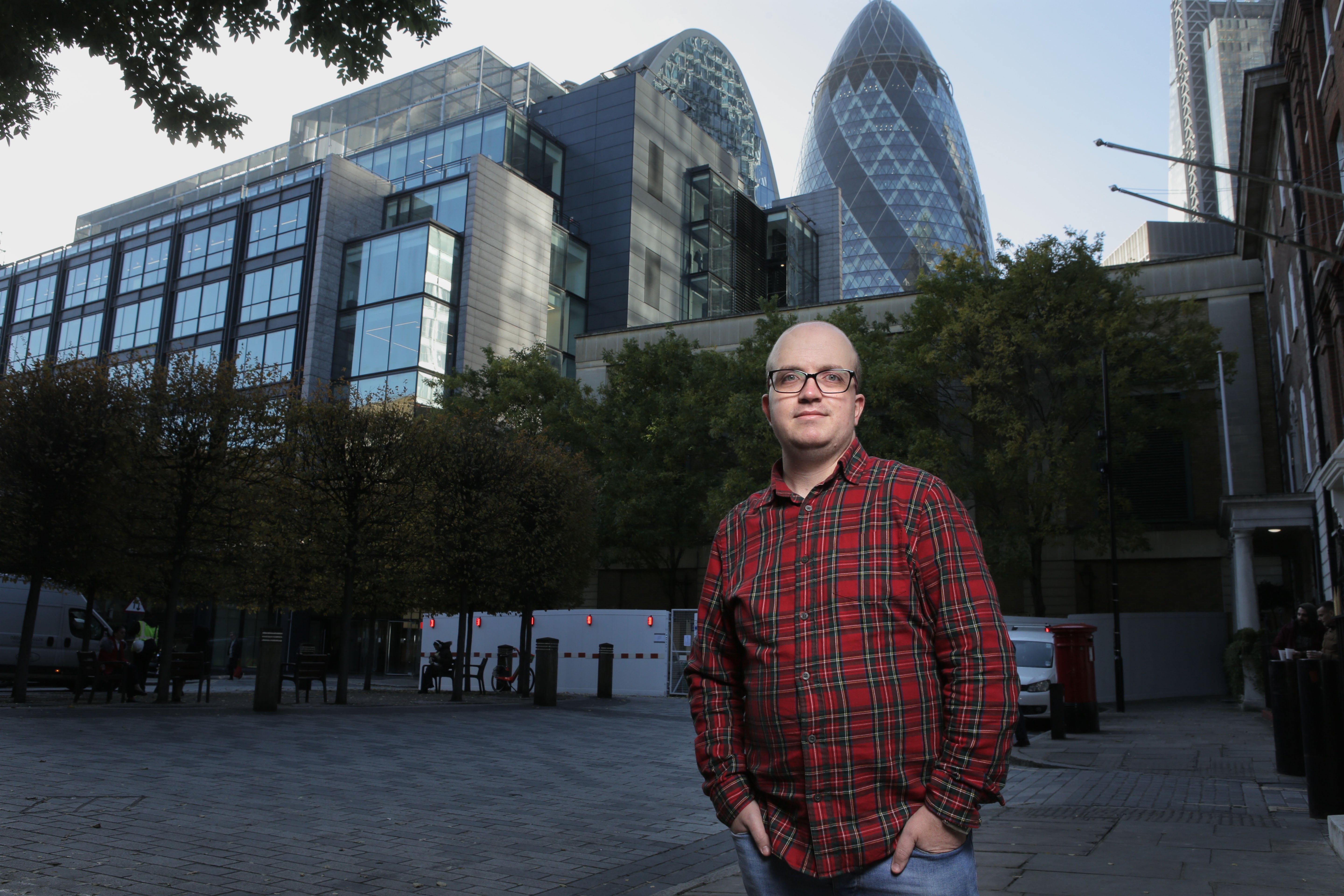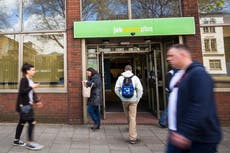‘It’s left me feeling utterly empty’: The plight of the young jobless struggling to find work in a pandemic
Covid recovery putting 16-24-year-olds at ‘back of the queue’, with one in five young Londoners unemployed
Paulo was excited. After diligently making up to 10 job applications a day for two years, he had finally cracked an interview for an entry-level administrative position at a finance company – and as the interview progressed, he felt his hopes rising.
“It was all going so well and my answers seemed to really hit the mark,” said Paulo. “I thought, wow, after all this time, could this be it?” But as the questions rained in, Paulo got anxious and started to fidget. “I could feel the mood in the room changing,” he said. “I think my nervousness was a bit obvious, a bit off-putting to them."
The 23-year-old from Stratford, whose dream is to become a City commodity broker like his dad, never heard back. Not even a courtesy call to say “sorry, you were unsuccessful”. Despite making, he estimates, a staggering 4,000 job and apprenticeship applications over a two-year period prior to the pandemic, he had secured just seven interviews. And no jobs.
“Each application took me up to 90 minutes because I always tried to mould myself to each position and to put thought into it,” he said. “You get an automated response thanking you for your application and in most cases you never hear another word. Those seven interviews, I never even got told I had been turned down. There was no feedback. I was completely ghosted. Like it never happened. You have no idea where you are going wrong. You can’t imagine how hard it is to keep trying.”
That barren two-year run was broken in 2019 – albeit briefly - when Paulo had a breakthrough of sorts. He got hired by a caterer via the online jobs platform Coople to be a part-time waiter and bar-tender to work for £10-an-hour at banqueting venues across London, including the Waldorf Hotel and Twickenham Stadium. It was only two days a week but at last he was earning and making progress.

But then Covid hit and in August last year the caterer said they had to let him go. Paulo was once again unemployed and making job application after job application. “It is a process that is completely soul destroying,” he said. “Two years of trying and failing after I left college and now well over a year of not working since Covid has left me feeling utterly empty.”
Paulo is one of 105,000 Londoners aged 16-24 who are registered as unemployed – and one of 24,000 young people who have suffered the crushing effects of long-term unemployment of six months or more.
In a week-long exposé of the problem starting today, we tell the stories of young people struggling to find work since the pandemic and address two critical questions: Why is the jobless rate of young Londoners, at 21 per cent, almost six times higher than the unemployment rate of 25-34 year-olds? And why is this happening when job vacancies have risen to a record of almost 1.2 million countrywide?

Steve Haines, spokesperson for Impetus, a group that helps charities transform the lives of disadvantaged youths, said young people have borne the economic brunt of the pandemic. “When Covid hit, young people with the least experience were the first to be laid off. Later when vacancies opened up, they lacked experience putting them again at the back of the queue and pointing to a major skills mismatch between employers demands and what young people have to offer. The fact is that a significant proportion of unemployed young people aren’t work=ready and need support before they have the skills and confidence required by employers."
Dr Joe Marshall, chief executive of the National Centre for Universities and Business, said the jobless statistics revealed “a skills mismatch standing in the way of the nation’s recovery”.
It is a mismatch that was predicted in 2019 by the Industrial Strategy Council, an independent government advisory group, who warned that “the skills mismatch is predicted to worsen significantly” and that “government and individuals will all have a role to play in reskilling and upskilling the existing workforce”, with maths, English, digital and communication skills seen as key.
Paulo is a case in point. His problems started when he left school with below par GCSE grades in English and maths that scuppered his dreams of a brokerage job in the City. He said: “My grandmother died during my GCSEs. It was quite a shock and made it hard to concentrate. I missed an exam because I confused a time, because I was so distraught. We were very close. I got Ds and Cs and below. After that I went to college to get a BTEC in book-keeping but I lost momentum and failed.”

Paulo grew up in a middle-income household where they were taught that hard work was rewarded, but five years ago his dad’s brokerage went under, putting the family under financial strain. He said: “My dad hasn’t worked since. I wanted to pull my weight like my siblings. I have three older brothers and sisters and they all have decent jobs, but I have faced constant failure to make headway.”
He added: “I go online everyday and I see lots of vacancies for entry-level jobs but they are asking for candidates with several years of experience which I don’t have. I feel my chances are slim to nothing. Even my friends who went to uni can’t get proper jobs and feel lucky to get work as a barista."
For Paulo, rebuilding his confidence has become a daily battle. He said: “For a long time I felt very depressed. I never wanted to let anyone know because I didn’t want to burden anyone, but I could tell that my parents were worried.”
Paulo’s goal is to get office-based work so he can learn transferable skills and build his way up, step by step, to one day work in the City, perhaps in a back-office like one of his brothers. He said: “I have been working on myself to improve my verbal presentation to employers to sound more sophisticated and not just speak in short, simple sentences. I have an interview for an apprenticeship coming up. I know that I will struggle to sleep the night before and that I will get raised blood pressure. On the day I will tell my mind it will be alright, but my hands will tell me it’s going to be bad.” He laughed. “I think I can do this. I so want to get a job and make my parents proud. Maybe this time.”
Derry’s story

Derry arrived for our interview looking sharp in a suit and tie. “I have interviews for reception work at two 4-star hotels, one at the Hilton in Angel and one at the Barbican, he declared brightly. “My motto is be prepared.”
The 29-year-old from Hackney has been unemployed since Covid ended his job as a restaurant back-office administrator and he has made about 1,500 job applications in the last year – yielding zero interviews – so these two interviews in quick succession represented a major opportunity.
But Covid was not the first time Derry’s world had been upended. Nine years ago, having completed a two-year plumbing course, Derry was following his passion of working in the building trade in the footsteps of his dad and uncles when he suffered a terrible headache, blacked out and woke up three days later in The National Hospital for Neurology and Neurosurgery.

“They told me I had been in a coma for three days,” he said. “It turned out I had a brain tumour. They did a biopsy and it was benign, but if it had grown any bigger they thought it would become cancerous, so I had to have extensive radiotherapy, and although my brain was fine, the biopsy affected my balance and gave me dizzy spells. It meant I could no longer do heavy lifting or work on a construction site and that I would have to completely change what I did to support myself financially.”
As Derry lay in bed recovering, he watched a lot of TV, especially the Food Channel. “One day my dad joked, ‘you watch so many food programmes, you should become a chef’. And I thought, why not?” When he was strong enough, he signed up for a catering course at Hackney College, which he completed part-time over three years, emerging with an NVQ and getting work as a kitchen porter and commis chef for £11 an hour.

“It was all going well, but then because of my health history, I was told that I shouldn’t be working in a kitchen,” he said. “I spoke to my manager who was incredibly supportive because he saw how hard-working I was. He moved me to a job in the back office sorting out reservations and invoices. I was there four months but then Covid hit and because I was designated high risk, I had to self-isolate. I was on furlough for eight months but the restaurant went bust and we were all made redundant. I have not worked since.”
Derry worries whether he will ever again find an employer as understanding as his last. “My balance and coordination is about 10 per cent affected by what happened so new tasks can take me a bit longer to get the gist of, but once I know how to do something, I am a whizz. My old manager respected what I could and couldn’t do and that I sometimes needed a bit of time and supported me. How will I find another job where they know me and where I feel so valued?”
Derry applies for more than 30 jobs a week. “I treat it like a job. Every day I go to work to find work. I am systematic and treat the whole process like a 9-5 situation. The problem is you never get any response. After a while you feel p***ed off. I’ve got work experience but still I’m not cutting through. I don’t know where I’m going wrong. I am loyal and reliable but until someone takes a chance on me, they won’t know that. My hopes are riding on these two interviews. I just need someone to give me a break so I can show them what I’m made of.”
Since our interview, Paulo and Derry have had contrasting fortunes. Paulo has landed an apprenticeship as a business administrator with Hurak Education Services. Derry did not get the receptionist jobs.
Join our commenting forum
Join thought-provoking conversations, follow other Independent readers and see their replies
Comments
Bookmark popover
Removed from bookmarks